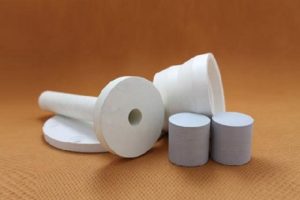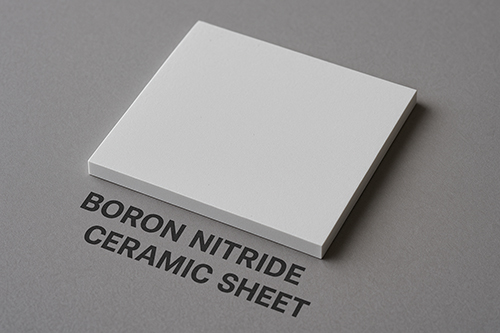What Makes Boron Nitride Ceramic Resistant to Thermal Shock?

Boron Nitride (BN) ceramic is a unique material with exceptional thermal and mechanical properties. Its ability to withstand rapid changes in temperature without cracking or breaking has made it a popular material for use in a wide range of high-temperature and high-stress applications. So, what exactly makes boron nitride ceramic resistant to thermal shock? Let’s take a closer look at its key properties and how they contribute to its thermal shock resistance.
Excellent Properties of Boron Nitride Ceramics
High thermal conductivity
One of the main factors that contribute to the thermal shock resistance of BN is its high thermal conductivity. Thermal conductivity is a measure of a material’s ability to conduct heat, and it is expressed in units of watts per meter-kelvin (W/mK). The higher the thermal conductivity of a material, the faster it can dissipate heat and distribute it evenly across its surface.
Boron nitride ceramic has a very high thermal conductivity, with values ranging from 20 W/mK to 200 W/mK, depending on the specific type of BN ceramic. This high thermal conductivity allows the material to quickly adjust to changes in temperature, minimizing the buildup of thermal stress within the material that can lead to cracking or breaking under rapid temperature changes.
Low thermal expansion coefficient
Another key property is that boron nitride has a low coefficient of thermal expansion. The coefficient of thermal expansion refers to how much a material will expand or contract when exposed to changes in temperature. A low coefficient of thermal expansion means that the material does not expand or contract significantly when exposed to changes in temperature.
The coefficient of thermal expansion of boron nitride ceramic has very low, typically ranging from 1 to 4 parts per million per degree Celsius (ppm/°C). This property helps to minimize the buildup of thermal stress within the material, reducing the likelihood of cracking or breaking under rapid temperature changes.
Good chemical Inertness
In addition to its thermal and mechanical properties, boron nitride ceramic is also chemically inert. It does not react with other materials or degrade under harsh chemical conditions. This property makes it an ideal material for applications where other materials might corrode or degrade over time.

Applications of Boron Nitride Ceramic
Due to its exceptional properties mentioned above, boron nitride ceramic is used in a wide range of high-temperature and high-stress applications, including:
- Aerospace: Rocket nozzles, thermal protection systems, missile components, etc.
- Industrial processing: Molten metal handling, hot isostatic pressing, glass manufacturing, etc.
- Semiconductor manufacturing: Wafer processing, heat sinks for high-power devices, etc.
- Medical and dental: Orthopedic implants, dental tools, etc.
Conclusion
In summary, its high thermal conductivity, low coefficient of thermal expansion, and chemical inertness make boron nitride an ideal material for use in a wide range of high-temperature and high-stress applications. If you are interested in finding high-quality BN ceramic products, please visit our website for more information.
{{item.content}}
LEVE A REPLY
{{item.children[0].content}}
{{item.content}}
LEAVE A REPLY
SUBSCRIBE OUR NEWSLETTER
- How PBN Crucibles Ensure the Quality of GaN & SiC Epitaxial Materials
- SiC vs. Quartz Focus Rings: A Cost and Performance Analysis for Advanced Etch
- AlN Ceramic Substrates: Enabling Next-Gen Electrostatic Chucks
- The Amor of Semiconductor Tools: Why High-Purity Al2O3 & AlN Are Preferred for Plasma Process Chambers
- Silicon Carbide - Ultra-High Temperature Ceramics for Extreme Environments










